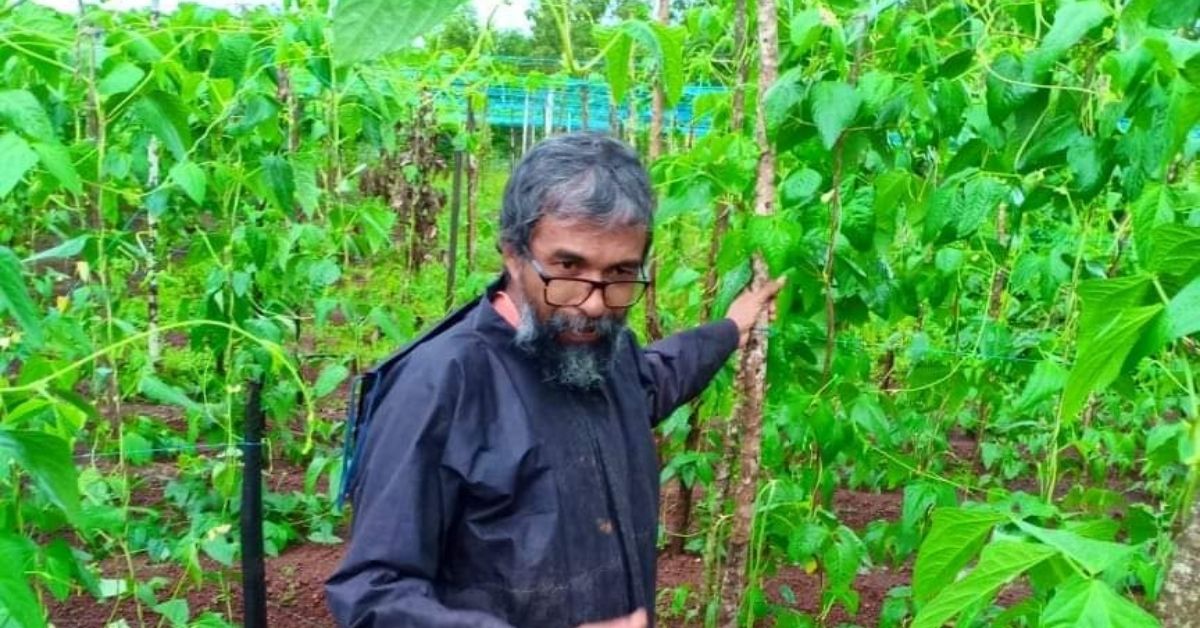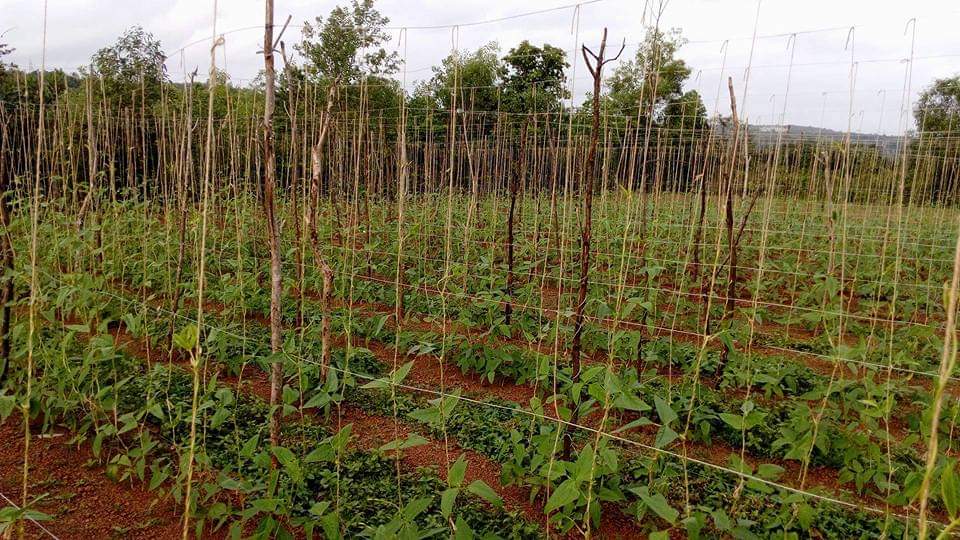Meet Kerala’s ‘Mr Bean’: Journalist Cultivates 80 Varieties of Beans & Veggies
51-year-old journalist Narayanan Kannalayam from Kerala grows 87 varieties of beans on his farm, with an aim to conserve the older varieties of the crop. So far, he has inspired around 80 women from his area to grow their own kitchen gardens, and grows a variety of other vegetables like cauliflower, ginger, radish, and carrot, among others.

Five years ago, when the United Nations General Assembly declared 2016 as the International Year of Pulses, journalist Narayanan Kannalayam began his research into the pulses cultivated in his home state, Kerala.
“My research took me to Wayanad’s M S Swaminathan Research Foundation’s Community Agrobiodiversity Centre. There, I found out that 97 varieties of beans are grown in Kerala, and of them, three are wild varieties which are not edible. I took 23 varieties from the institute back home,” 51-year-old Narayanan, who belongs to Kasaragod, tells The Better India.
He began cultivating the seeds the same year on his 7-acre land. He also collected over 80 varieties of beans from traditional farmers all over India, including areas like Rajasthan and Assam.
“I was aware of organic cultivation from a young age, because I come from an agricultural family. I grow beans to conserve them, rather than to make a profit. I grow around 30 varieties at a time, because growing them all together is hard and increases the risk of cross-pollination,” he says. With this thought in mind, he says he’s rather a conservator than a farmer.
“Years ago, many farmers were conservators as well, but now they focus more on hybrid varieties and their distribution. A farmer should never forget that only if old varieties survive can new ones be made,” he says.
Mr Bean

Narayanan’s mother P Shantha and wife Sreeja help him at the farm. Their routine entails reaching fields to water the plants around 5 am, and by 7:30, Narayanan heads for office. His mother and wife look into other requirements on the land, such as planting new saplings and harvesting vegetables. Narayanan returns home by 4 in the evening, and joins his mother and wife on the plot, where they hand over the remaining work to him. After finishing off work around 10 pm, he hits the sack, as he has to be up early the next day.
Narayanan grows 87 varieties of beans on his farm, including puli payar, kappa payar, piriyan, chatura payar and valli payar. Apart from beans, he also grows cauliflower, ginger, radish, carrot, ridge gourd, snake gourd, bitter gourd, okra, dragon fruit, mango, spinach, brinjal, cucumber, cassava, yam, taro, turmeric, sweet potato, sugarcane, rubber, among others. He also has 12 varieties of plantain and seven varieties of lemon. He uses cow dung powder for manure.
The produce is sold at Kolathur Farmers’ Society at Perladukkam in Bedadka panchayat, from which he earns around Rs 25,000 a month. He sells the seeds to nearby farmers in his village. “I want other farmers to cultivate vegetables as well, and to motivate them, I give out these seeds for free. More than 25 farmers collect seeds from me on a monthly basis,” he says,
Narayanan also sells value-added products like bitter gourd crisps and curd chilli, which are now popular products in her village.
Inspiring many others like him

Students from different schools and colleges also visit Narayanan’s land to learn about cultivation. “Most students know about the different varieties of vegetables and fruits, but haven’t seen them all in real life. After taking guidance from me, many have started their own kitchen garden,” Narayanan says.
Around 80 women have started growing their own kitchen gardens as well. Nalini M, former gram panchayat member and Narayanan’s neighbour, says, “I visited Narayanan’s organic garden several times, and was inspired to grow my own vegetables. Now, I grow beans, tomato, banana and chilli. Many homemakers like me have their own kitchen garden at home as well in Bedadka.”
Edited by Divya Sethu
If you found our stories insightful, informative, or even just enjoyable, we invite you to consider making a voluntary payment to support the work we do at The Better India. Your contribution helps us continue producing quality content that educates, inspires, and drives positive change.
Choose one of the payment options below for your contribution-
By paying for the stories you value, you directly contribute to sustaining our efforts focused on making a difference in the world. Together, let’s ensure that impactful stories continue to be told and shared, enriching lives and communities alike.
Thank you for your support. Here are some frequently asked questions you might find helpful to know why you are contributing?


This story made me
-
97
-
121
-
89
-
167













